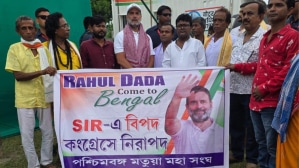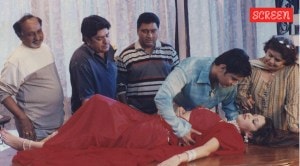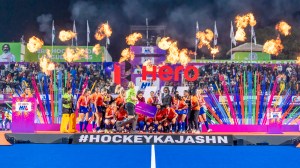Stay updated with the latest - Click here to follow us on Instagram
12 of Mumbai’s 36 MLAs couldn’t spend their entire constituency fund
A report by MumbaiVotes, a decade-old initiative, evaluates performance of city MLAs over the last five years.
 The report, brought out by the organisation MumbaiVotes, shows, for example, that 12 MLAs in Mumbai did not exhaust their area development funds through their five-year tenure.
The report, brought out by the organisation MumbaiVotes, shows, for example, that 12 MLAs in Mumbai did not exhaust their area development funds through their five-year tenure.
Amid growing agreement that much of the misgovernance results from inadequate political accountability, a decade-old initiative in Mumbai has now brought out its election-time analysis of the performance of Mumbai’s 36 MLAs vis-a-vis their promises, the issues they addressed while spending their Local Area Development Funds, their attendance in the Vidhan Sabha and much more.
The report, brought out by the organisation MumbaiVotes, shows, for example, that 12 MLAs in Mumbai did not exhaust their area development funds through their five-year tenure. Of these, two were ministers – Arif Naseem Khan of Chandivali (he spent 76 per cent of his funds) and Sachin Ahir of Worli (93 per cent). Seven of these 12 MLAs spent 98 or 99 per cent of the funds.
The report, titled Promise Versus Performance, provides a useful “differentiation between leaders and laggards”, as Vivek Gilani, founder and director of operations at http://www.MumbaiVotes.com, puts it.
The report not only analyses the performance of each MLA on different parameters as obtained through RTIs, but it also makes an assessment of all the reportage that has appeared in Mumbai’s newspapers (including IE’s own coverage) from 2009 to 2014 and documents their actions against promises made by them during their election campaign or while in office. It also factors in responses to elaborate questionnaires sent to all the MLAs.
The details, such as exactly what percentage of funds were spent on toilet construction or on community welfare programmes, together provide useful insights into the functioning of elected legislators and turns the spotlight on issues that remain unaddressed.
Though the initiative began 10 years ago, what the organisation found it heartening this year was that most of the MLAs were not only willing to provide detailed and accurate information on work they undertook and accomplished, but they were also proactively calling up the organisation to update information about themselves on its website.
The MumbaiVotes initiative began around the 2004 Assembly elections, with the objective of analysing Mumbai’s sitting MLAs’ performance. By 2008, it had grown into a city-wide project partnering with several other academic and civil society institutions. “The purpose was to maximise civic happiness through progressive democracy, informed education of citizens, tracking of elected representatives’ work on issue and areas you care about,” says Gilani.
There were also a few problems with the entire exercise. “For example, when we contacted one South Mumbai BJP MLA, the response was prompt. But the quality of information provided was not very good. In some cases, information was provided in the form of brochures and publicity material when we were actually looking for certified data on expenditure, proof of projects being inaugurated, etc,” says Shweta Singh of the MumbaiVotes.
There is, however, a greater degree of awareness now among MLAs that the information on them is available online. On Google, for example, the http://www.MumbaiVotes.com profile appears right below Mumbai MLAs’ Wiki profiles. One north Mumbai corporator, in fact, emailed asking for information on his court cases to be updated. “He had been cleared by the sessions court and he wanted to provide proof of that to update the information,” says Gilani.
Prakriti Shukla of Mumbai Votes says, “We found that after providing information, MLAs also encouraged peers to do the same. That they were talking among themselves about the nature of information available online was quite clear.”
During the Lok Sabha elections, Aam Aadmi Party’s six candidates in Mumbai were a refreshing change in that they were all committed to transparency, say the MumbaiVotes members. They were quite clear in articulating their party’s stand on city issues and were meticulous in making sure that all information sought was made available, the team says.
Overall, the attempt by MumbaiVotes was two-pronged – to assess performance in terms of work done by MLAs and their participation in the Assembly, and to evaluate their performance vis-a-vis their manifesto. “The manifesto should be the one promissory note that candidates make while contesting. They should be held accountable,” says Gilani.
Next on the MumbaiVotes agenda? A report card for MPs and expanding operations to every major city starting with Delhi.
As Gilani says, “We can’t stop till every city has this kind of information made available to people days before they go out to vote. It can transform the quality of vote substantively.”
Do such initiatives have any impact?
Alan D’Mello of MumbaiVotes says traffic on their website and on their social media handles can be seen as one indicator of its impact, although there is no measurable assessment of behaviour of those who consumed this information. “Traffic saw a tremendous hike. The site has now seen 6 lakh unique visitors and there was a 400 per cent hike in traffic around elections,” D’Mello says.
Advanced locality management groups and citizen federations that have organised Meet Your Candidate events before elections have also begun to use the information offered by MumbaiVotes for framing questions and for assessing performance versus promise.
Praja Foundation, another non-partisan voluntary organisation, also does a ranking of MLAs. Their report on Mumbai’s 36 MLAs was released recently: “The electorate has remained a silent witness for most part of this and are feeling let down and frustrated by the government… The elections are the only time when elected representatives are appraised for their performance,” the report said. Such an effort provides a dialogue and appraisal of the working of elected representatives, it said.
Nitai Mehta, founder of Praja, says the impact of these efforts is slow but sure. “We’re hoping that citizens will eventually use initiatives like ours as a tool for more informed voting.”
In fact, at least 10 MLAs who scored poorly on Praja’s report card have been renominated. “A classic example is Lalu Prasad. People are still voting for him and his party… When Jayalalithaa returns from jail and if she contests, she will win with a thumping majority,” Mehta says. Like MumbaiVotes, he too has seen some heartening interest from the political class. One corporator from Behrampada in Bandra (East) walked into the office of Praja once and asked how she could improve her ranking.
According to Mehta, organisations such as Praja need to work towards creating a currency for this requirement of informed voter behaviour.
Highlights of the findings
* While 31 of 36 MLAs utilised more than 95 per cent of their MLA local area development funds, a little over 0.5 per cent (Rs 1.5 crore) of the total amount of around Rs 280 crore allocated to them for five years was spent on health and education. This is based on information obtained by Mumbai Votes under the Right to Information Act.
* Of the total amount, only 21 per cent or Rs 56 crore was spent on building toilets.
* Only two MLAs, Naseem Khan from Chandivali and Baba Siddiqui form Bandra, spent less than 90 per cent of these funds.
* On utilisation of funds, NCP and Congress fared the poorest while all MNS legislators spent 100 per cent of their funds.
* On attendance in the Maharashtra Assembly, the MNS fared the poorest on account of Ghatkopar MLA Ram Kadam’s 56.81 per cent attendance while the NCP fared the best.
* The two MLAs with the lowest attendance records in the Vidhan Sabha were Kadam (56.81 per cent) and Congress MLA from Kalina Kripashankar Singh (57.28 per cent). None of Mumbai’s MLAs scored a 100 per cent attendance record. The top scorer here was Congress MLA Ashok Jadhav and BJP MLA (recently elected MP) Gopal Shetty, who ended the term with 96.24 per cent attendance.
* Two Congress MLAs, Baldev Khosa and Jagannath Shetty, both now renominated by their party, did not ask a single question in the House during their five-year term. Chandrakant Handore, also of the Congress, asked three questions, Kripashankar Singh asked 10 and Annie Shekhar, also of the Congress, asked 28. All the 31 other Mumbai MLAs asked at least 100 questions during the last five years.
* The Opposition benches naturally had the bulk of the questions with eight MLAs asking more than 1000 questions each – Prakash Bala Sawant (1,045), Gopal Shetty (1,059), Yogesh Sagar (1,071), Abu Asim Azmi (1,288), Mangesh Sangle (1,298), Vinod Ghosalkar (1,375), Subhash Desai (1,443), Bala Nandgaonkar (1,650) and Ravindra Waikar (1,711).
* Seen party-wise, NCP MLAs had the least number of queries for the ministers.
* Of the 36 Mumbai MLAs, only six proposed any new legislation during the last five years. The six are Nitin Sardesai (MNS), Nawab Malik (NCP), Mangesh Sangle (MNS), Shishir Shinde (MNS), Ravindra Waikar (Sena) and Subhash Desai (Sena). Of the 20 Bills proposed, 10 were initiated by senior Shiv Sena legislator Subhash Desai.
For some, mum is the word
The best news of such exercises has been that politicians are growing slowly accustomed to the idea of accountability. While some MLAs in Mumbai responded with partial answers to a questionnaire sent out by MumbaiVotes, here are those that did not respond at all.
* Gopal Shetty (BJP)
* Vinod Ghosalkar (Sena)
* Pravin Darekar (MNS)
* Sardar Tara Singh (BJP)
* Mangesh Sangle (MNS)
* Shishir Shinde (MNS)
* Ramesh Singh Thakur (Congress)
* Baldev Khosa (Congress)
* Naseem Khan (Congress)
* Ram Kadam (MNS)







